Office of Emergency Services audit
reveals management deficiencies
Conroy agrees to Budget and Finance Committee recommendations
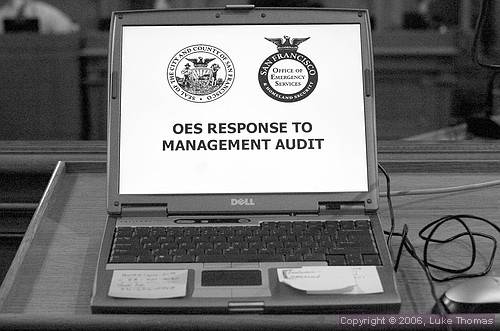
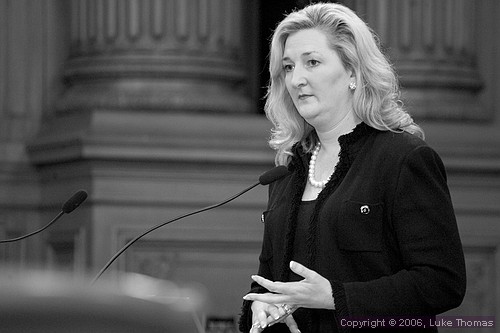
OES Director AnneMarie Conroy responds to Budget and Finance Committee
concerns
of OES management deficiencies highligted in a recent OES audit
report.
Photo(s) by
Luke Thomas
By Aldrich M. Tan
May 18, 2006
Members of the Board of Supervisors conducted a hearing discussing
the recent management audit of the Office of Emergency Services
at the Budget and Finance Committee on Wednesday.
"The serious deficiencies that we have documented show that
the office has not operated in the most efficient matter,"
budget analyst Harvey Rose said.

Budget Analyst Harvey Rose
Supervisors Aaron Peskin, Sean Elsbernd, Ross Mirkarimi, Chris
Daly and Michela Alioto-Pier, along with other agencies and members
of the public, questioned the efficiency of both the agency and
Executive Director Annemarie Conroy's management of the city's
emergency services.
The supervisors worked with Conroy and the budget analysts to
find consensus on recommendations that the agency partially agreed
to, or made no comment on. Out of 32 total recommendations, the
agency partially agreed on five, disagreed on three, and had no
comment on two, which included the termination of Conroy's position.
Peskin said he will be introducing a motion to develop a select
committee regarding emergency response at next Tuesday's Board
of Supervisors' meeting. Peskin invited Supervisors Alioto-Pier
and Mirkarimi to be part of that proposed committee.
"As residents celebrate the anniversary of earthquake and
devastation of New Orleans, which is a reminder of what not to
do, it is appropriate for the city to develop disaster readiness,"
Peskin said.
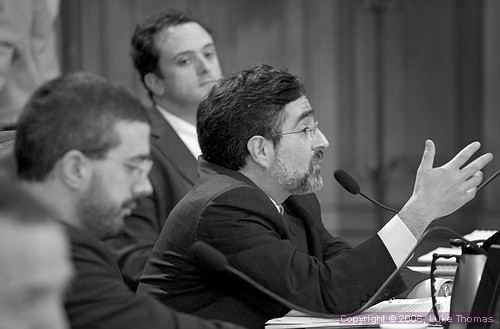
Supervisor Aaron Peskin
Requested by the Board of Supervisors last September, the Budget
Analyst conducted the management audit of the agency from Nov.
10, 2005 to May 7, 2006 and published the latest version of the
audit on May 15.
The audit made 72 findings criticizing the agency's communication
and coordination, legislative authority, strategic planning, grants
and budget planning and allocation, financial management, training,
equipment, response and staffing.
Implementation of the recommendations would have a one-time cost
of $1.47 million, Rose said.
In her response, Conroy told the committee, "We have had
some growing pains."
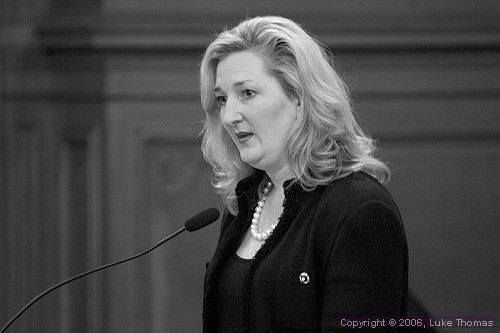
Conroy listed several of the Office of Emergency Service's accomplishments,
including the agency's 72hours.org Web site, which won the Webby
award. The Office is looking at developing a care and shelter
emergency plan, an animal care annex, a terrorism annex, and a
new notification system that would allow citizens to sign up for
emergency alert text messages.
Conroy added that the office has had 29 citywide training exercises
since 2004 which includes 8,310 personnel trainings. Large salaries
that were originally listed as salaries were in fact overtime
for police and fire officials to provide training, Conroy said.
Conroy said the agency has been working with the Controller's
Office to refine the numbers related to overtime training. Controller
Ed Harrington confirmed that Conroy asked the Controller's Office
to verify that $6.7 million of the Office of Emergency Service's
spending indeed went to overtime for training members of the police,
fire, sheriff, MUNI, medical examiner, public works, and the emergency
communications departments.
Budget analyst Debra Newman said her agency had constantly requested
the numbers regarding training information, cost information,
and exercise data but the Office of Emergency Service did not
comply with the request.
"This is the first time that we saw these numbers,"
Newman said.
The Budget Analyst did receive 30 letters from various organizations
including city departments speaking in support of the Office of
Emergency Services, including the California Office of Homeland
Security and the Public Utilities Commission.
"The progress your department has made preparing the city
for disaster is significant," Deputy Chief Greg Suhr of the
San Francisco Police Department wrote to OES in regards to the
Budget Audit.
Although Conroy received a letter in support of from the Public
Utilities Commission, Peskin presented an email from John Rodgers,
a Public Utilities Commission official, stating opposing remarks.
While the Public Utilities Commission and the Pacific Gas and
Electric Company worked collaboratively to develop emergency plans,
the Office of Emergency Services had not offered support for such
planning efforts, or incorporated information from that planning
effort into the city's plans, Rodgers said.
Supervisor Alioto-Pier asked Conroy if the Office of Emergency
Services asked for the letters from specific departments and agencies.
"I made some requests and the staff made some requests,"
Conroy said. "Everyone I asked to send a letter did so."
"This is not a popularity contest," Peskin said.
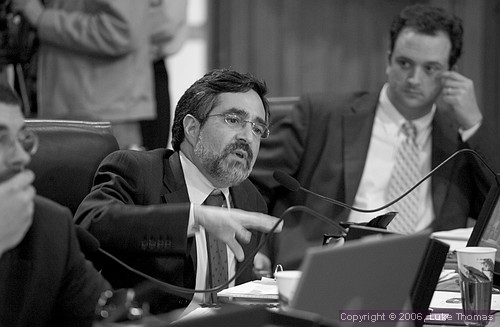
One organization that has not been pleased with the Office of
Emergency Services' conduct is the Bay Area Rapid Transit.
The agency conducted a tabletop exercise in February 2006 of
chemical agent releases in BART/MUNI station, but the Office of
Emergency Services did not invite BART or MUNI representatives
to coordinate such activities, budget analyst Newman said.
"That exercise was a notional and internalized exercise,"
Conroy said. "BART and MUNI did not have to be there."
Gary Gee, Chief of Police for the BART Police Department, disagreed
with Conroy.
"I believe that any drills related to terrorism should include
BART staff," Gee said.
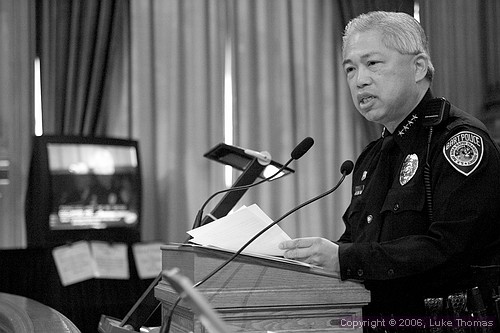
BART Chief of Police, Gary Gee
Under San Francisco Police Chief Heather Fong, BART participated
in joint emergency preparedness training with MUNI, which it shares
four downtown stations with. BART also had terrorism drills in
San Francisco and Oakland.
"When the Loma Prieta earthquake happened, BART continued
running," Gee said. "On September 11, BART made sure
workers in downtown San Francisco got to their homes safely throughout
the Bay Area. BART needs to be part of disaster planning."
Conroy said BART is upset because an Urban Area Security Initiative
grant could not pay for construction that BART had requested.
"Our agency did put forward a significant package for them
for the UASI under critical discussion," Conroy said.
Lynette Sweet, vice president of the BART's Board of Directors,
said the organization is far more concerned about their communication
with the city's Office of Emergency Services.
BART officials had made constant efforts since last October to
have a single meeting with the Office of Emergency Services to
discuss their Urban Area Security Initiative's grant request,
Sweet said. They received zero response from OES till this February.
BART officials were finally able to meet with the Office of Emergency
Services on February 15 after the Mayor's Office intervened one
week before the grant's deadline, Sweet said.
"I understand that Conroy is a busy person," Sweet
said, "but BART is one of the top ten threatened targets
in the case of a terrorist attack here. We should have a stronger
relationship with the city's emergency response team."

Lynette Sweet, vice president of BART Board of Directors
Lt. John Quinlan, director of the Area Office of Emergency Services
and Homeland Security from San Mateo County Sheriff's Office,
said he makes a concerted effort in regards to involving BART
in San Mateo's emergency planning. The organization always invites
BART representatives to its commanders group meetings every other
month.
"BART is a valuable asset but it is also a major target
of terrorism," Quinlan said. "Our cities must do what
they can to protect it."
Experienced emergency rescuer Dick Morten expressed concern that
various city departments of the city are still not prepared for
disaster. Morten volunteered for the Red Cross Disaster Action
team and served on flood emergency relief efforts in Sacramento,
Yuba City, and a fire relief effort in Natomas. He also received
Neighborhood Emergency Response Team training.
Morten took a first response self-training course at City College
of San Francisco and part of that training involved a ride-along
on a fire engine. Morten said he was shocked at the answer he
received when he asked a local fire captain where the emergency
supplies are.
"The supplies are at Safeway," Morten recalled the
fire captain saying.
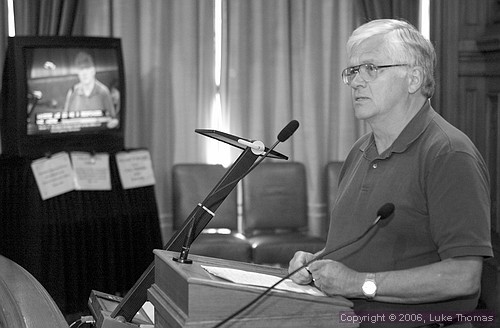
Dick Morten
Morten also cited one local hospital whose main supplies are
located in Contra Costa County.
"In the case of a real disaster, both of these agencies
are cut away from their supplies," Morten said. "How
are they going to function?"
Supervisor Mirkarimi expressed concern that Conroy is still being
paid full-time by the city even though she is actively pursuing
an outside education.
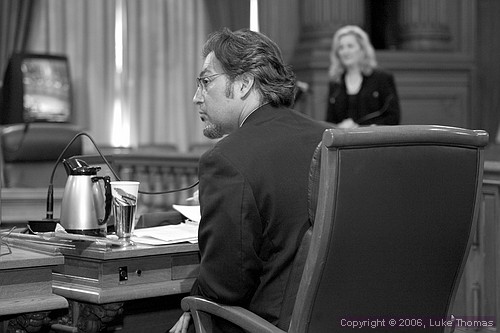
Supervisor Ross Mirkarimi
Conroy said she is pursing a Master's degree at the Naval Postgraduate
School in Monterey. The 18-month program requires on-site attendance
twelve weeks throughout the 18-month period, according to the
audit.
"What you get from the Naval Post Graduate School is a quality
of instruction and expertise that San Francisco has direct access
to from the program," Conroy said.
Mirkarimi asked Conroy if other directors of the similar Offices
of Emergency Services have participated in the Naval Postgraduate
School.
"They take different blend of kinds of officials and try
to mix up people of various backgrounds," Conroy said. "I'm
there to represent San Francisco and a local perspective on issues
of Homeland Security."
Mirkarimi also addressed issues of various departments' feelings
of disaster preparedness as reflected through the Disaster Council.
Since 2001, the Disaster Council has not forwarded any ordinances,
resolutions, rules or regulations to the Board of Supervisors
for adoption, budget analyst Newman said. The Disaster Council
has only approved one plan, the City's base emergency operation
plan, even though 17 plans have been developed in the past two
years.
"The Disaster Council seems like a congregation," Mirkarimi
said. "A church mouse is heard more than we would be. We
are composed and obedient no one talks out of line. It is simply
a thumbs up and thumbs down and there is no analysis."
Conroy criticized the televising of the meeting of the Disaster
Council meetings as one of the possible reasons why discussion
isn't happening
"What free debate do we lose when we have public meetings
and open meetings that are accessible?" Daly asked.
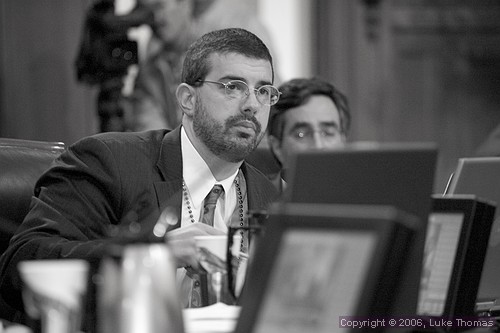
Supervisor Chris Daly
"I think some people might be more comfortable to speak
in closed sessions," Conroy said.
Peskin disagreed with Conroy.
"The only way that you can get a city ultimately ready and
prepared for a disaster is for the discussion to precipitate from
the departments to the public," Peskin said. "The role
of OES is a coordinated role. Exclusiveness and secrecy does not
encourage coordination."
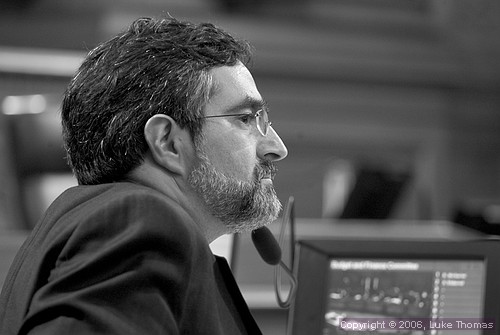
Supervisor Elsbernd shifted the discussion back to addressing
the audit itself, specifically recommendations that the agency
partially agreed on, completely disagreed on, or had no comment.
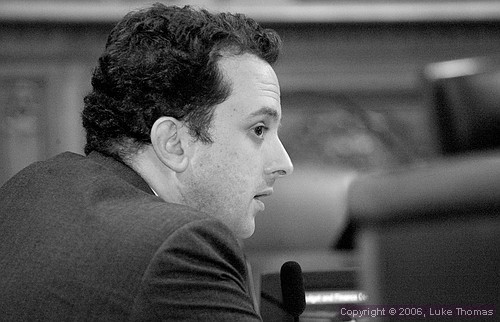
Supervisor Sean Elsbernd
Office of Emergency Services had partially agreed upon a recommendation
for the Disaster Council to review each city department's emergency
plan, annex, mutual aid agreement or report and determine which
of these plans should go to the Board of Supervisors for a public
hearing.
"The disagreement was that the previous plans do not have
to go to the Disaster Council," Conroy said. "The Disaster
Council should be talking about what is going to the Board of
Supervisors."
"We believe the Disaster Council is the political oversight
body for emergency services so all disaster plans should be brought
to the disaster council to decide," Newman said.
Conroy said the challenge would be to make sure the departments
submit their plans in a timely manner. Elsbernd suggested that
the Board of Supervisors should get involved. The Mayor's executive
order requires all of the department's revised emergency plans
completed by March 2007. The Budget and Finance Committee could
hold departments' budgets on reserve until they complied to develop
the plans.
The Office of Emergency Services partially agreed on a recommendation
for the Disaster Council to be convened in order to review existing
composition, purpose, role and responsibilities of the Disaster
Council and then recommend changes to the City's administration
code.
Elsbernd said Peskin's proposed committee will serve as the middle
ground to counsel the Disaster Council. Conroy agreed to the amended
recommendation.
The agency partially agreed that the Grants Divisions of the
Office of Emergency Service should investigate grants operations
and implement policies for claiming advanced reimbursement.
Grants from the Office of Emergency Services are provided on
a reimbursement basis, budget analyst Peter Rumble said. The delays
of claiming reimbursements to these grants have cost the city
over $190,000 in lost earned interest, over $1,068 daily.

Budget Analyst Peter Rumble
"Homeland Security is not encouraging of this process,"
Conroy said. "You have to make sure that you are spending
the money from the federal government at a certain amount of time
or we owe interest."
The Office of Emergency Services said it would add more staff
for the claims to be filled as addressed in the Mayor's Executive
Order. Elsbernd suggested the Controller's Office should be involved
with the program since the grants involve general fund dollars.
The agency partially greed on a recommendation for the Disaster
Council to appoint an agency to manage coordination that addresses
long term planning. The Office of Emergency Services has plans
for the first seven days of disaster, budget analyst Bree Mawhorter
said. However, the agency hasn't developed a specific recovery
plan for 30 days onward.
"This sounds like something that the proposed committee
can bring up," Elsbernd said.
The Office of Emergency Services partially agreed on reorganizing
its entire grants division by eliminating two manager positions
to fund three lower-level grants associate positions.
"We agree on this 98 percent," Conroy said. "We
are waiting for the grants but there will definitely be restructuring."
The agency's first disagreement regarded requesting the Board
of Supervisors approve the official name change of the Office
of Emergency Services to the Office of Emergency Services and
Homeland Security.
"The name change preceded me," Conroy said. "It
is important for outside agencies to know our connections with
Homeland Security."
The Office of Emergency Services disagreed with the idea of reconfiguring
1011 Turk St. to accommodate both the Emergency Operations Center
and the Office of Emergency Services.
The Office of Emergency Services said they had worked with the
Department of Public Works to develop a plan for modernizing the
Emergency Operations Center. However, the budget analyst's discussions
with the Department of Pubic Works revealed no such walkthroughs
or analysis had occurred.
"The building is deficient in size for a full and functioning
emergency center," Conroy said.
The agency disagreed on the budget analyst's recommendations
to eliminate a cafeteria and weight room in the building and have
it reconfigured for Office of Emergency Services' staff.
"We need the lunchroom space because we need a quiet space,"
Conroy said. "The SEIU uses the exercise room so we would
have a heck of a time dealing with them if we take out the weight
room."
The agency also disagreed on a recommendation to assess and help
City departments improve seismic safety.
"We're happy to assist any way possible but we don't have
seismic engineers," Conroy said. "We've helped departments
set up seismic retrofitting before but we just don't want to be
held accountable for looking at seismic vulnerability."
"We're not talking about engineers," budget analyst
Rose said. "We just need someone to coordinate the efforts."
As a supervisor whose district had been hit during the Loma Prieta
earthquake, Alioto-Pier said she is concerned that Conroy does
not know specific areas of the city that are vulnerable to earthquakes,
such as a recreation center in Alioto-Pier's district.
"I'm curious if you believe that your role as a director
of OES is to go further beyond drills and grants," Alioto-Pier
asked Conroy.

Supervisor Alioto-Pier
Conroy had no response to Alioto-Pier's question concerning the
said recreation center.
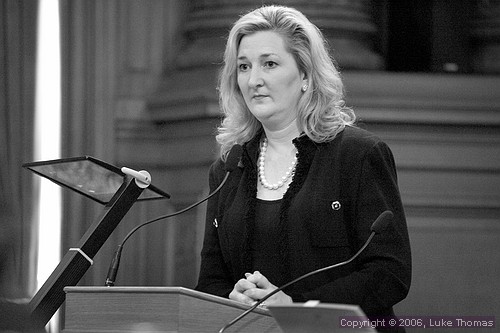
The Office of Emergency services disagreed on a recommendation
regarding Conroy's extra education. The recommendation asks the
Department of Human Resources to establish specific policies and
guidelines regarding the amount of time that city employees spend
attending conferences, classes, or other training and professional
development activities.
The agency defers to the Department of Human Resources, Conroy
said.
The management audit suggests that the Mayor should also eliminate
the position of Executive Director of the Office of Emergency
Services upon completion of the current director's tenure, or
if grant funding runs out. Conroy had no comment about the specific
recommendation.
Daly said Conroy is not the right person to serve as director
of the Office of Emergency Services.
"She has served capably in different functions," Daly
said, "but given what we saw happen in New Orleans, we should
have someone who has significantly more experience and significantly
more qualifications. I'm not calling for anyone to be fired or
resign. I just don't think the fit is right."

The audit suggests that the executive director of the Emergency
Communications Department should take on the roles of the Office
of Emergency Services director.
Jullian Potter, Director of Public Policy, said that the position
description has been issued for the Emergency Communications Department
director and the Controller's Office is going to be part of that
search.
Potter said she had no comment in regards to the recommendation
itself.
"We are waiting for what the UASI grants will look like
next year and who will be filling the ECD position within the
next two to three months," Potter said.

Jullian Potter (right)
The mayor's office stands behind the Office of Emergency Services,
Potter said. On May 10, Mayor Gavin Newsom issued executive directive
06-01, which identifies 19 action items to further the city's
emergency planning efforts based on the audit.
"We feel good about this audit and we will make sure that
the department implements the recommendations," Potter said.
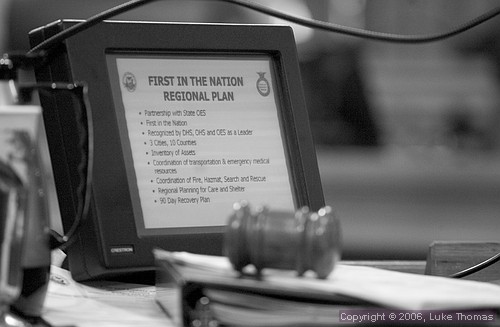
####
|